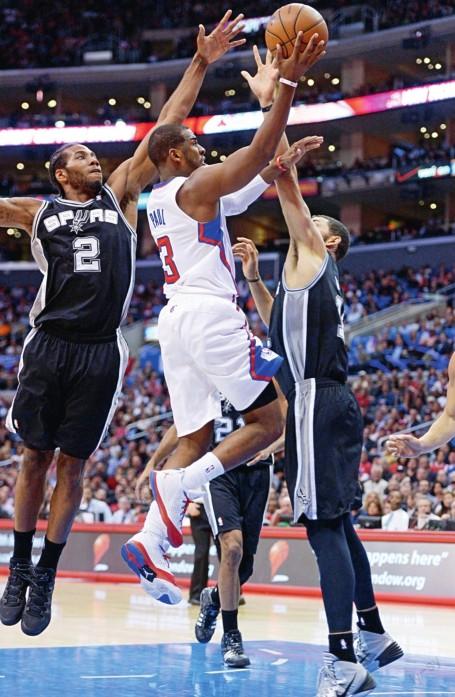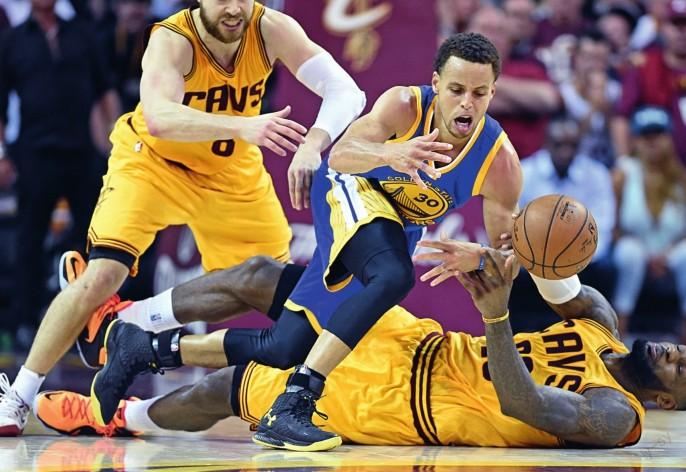人工智能
Howard Beck


As NBA Schedule-Maker Departs, He Takes with Him an Era League Wont See Again.
随着NBA赛程制定人离开,他带走的是我们再也看不到的一个时代的传奇。
The memorabilia has been bubble-wrapped—the autographed Willis Reed print, the kitschy poster from the 1978 Finals. A brawny typewriter, the Royal 440, rests on the radiator. An NBA staff guide, dated 1975-76, peeks out from a shelf.
收藏品已经用气泡膜包裹好了——一张威利斯·里德签名的,花哨的1978年总决赛海报。暖气片上是一个敦实的打字机,型号Royal 440。还有一本1975-76赛季的NBA员工手册,从书架上斜了出来。
And on the desk sits a yellowed Rolodex, jammed with four decades of key NBA figures. But the real power rests beside the Rolodex.
桌上摆着一个黄色的Rolodex名片整理盒,里面放满了40多年来NBA大人物们的名片。可真正的权力,却在名片整理盒旁边。
Thats where the PC is. The one with the spreadsheet containing all those arena dates and television commitments and grudge matches. The one that dictates where every NBA team will play, and when.
那里放着电脑。储存在这台电脑里的表格中包含所有球馆数据、电视转播合同和仇敌之间的比赛安排。这台电脑,决定了每一支NBA球队何时会在哪里打比赛。
For the last 30 years, Matt Winick has punched the keys on this PC and arranged all of those dates, color-coding for home games (blue) and away (red), agonizing over every six-game road trip and every back-to-back set, bracing for the complaints that were sure to follow.
过去30年,马特·威尼克在这台电脑上敲敲点点,安排了所有比赛日期,用不同颜色标记主场(蓝色)和客场(红色)比赛,为每个六连客和每次背靠背感到苦恼,然后坦然应对随后必将听到的抱怨。
"I tell the teams, Hey, thats the way the computer did it," Winick said from behind his desk. "But it was never the computer. I was the computer.”
“我跟球队说,‘嘿,电脑就是这么工作的。”坐在桌后的威尼克说,“但从来就不是电脑(在工作),我就是电脑。”
Officially, Winick has carried the title of senior vice president, but he is best known as the NBAs Scheduling Czar—a role he alone has held since 1985, a role he is now relinquishing for good.
威尼克挂着高级副总裁的官方头衔,但所有人都知道,他是安排NBA赛程的“沙皇”——从1985年开始,他就独自拥有这个头衔,而现在,他要永远卸下这个头衔了。
The 75-year-old Winick, who first joined the NBA in 1976, is stepping down (not retiring, he insists) at the end of the month, taking with him four decades of memories, mementos and scheduling wisdom.
1976年加入NBA的威尼克现在已经75岁了,他准备在本月底退下来(他坚称不是退休),带走长达四十年的记忆、纪念和赛程安排的智慧。
The spreadsheet has been bequeathed to Tom Carelli, the leagues senior vice president of broadcasting. Carellis team produced the recently released 2015-16 schedule, the first without Winicks fingerprints since the 1984-85 season.
接手那些表格的是联盟广播高级副总裁汤姆·卡莱利。卡莱利的团队负责制定了最近公布的2015-16赛季赛程,这也是自1984-85赛季后第一次威尼克没有参与制定赛程。
"I always described it as a jigsaw puzzle with 1,230 pieces"—one for every game—"and if one of them doesnt fit, it doesnt work," Winick said. "All 1,230 pieces have to fit."
“我一直将那看作一个多达1230块的拼图。”一块拼图就是一场比赛,“如果其中一个不合适,全部就废掉了。”威尼克说,“全部1230个都要合适。”
There is a mix of pride and wistfulness and relief in his voice, all filtered through a New York accent. Theres nothing like the satisfaction of finishing a puzzle. Nor the stress of getting there. The puzzle is critical, fascinating, complex. The puzzle is a headache.
在他的纽约口音中,我们可以听出自豪、伤感与一丝解脱。没有什么能比解决一个谜题更让人满足的了,更不要提整个过程的巨大压力。这是一个重要的、引人入胜的,复杂的谜题。这是一个让人头疼的谜题。
The best part of the job?
这份工作最好的部分是?
"Getting it done," Winick said. "I dont know if it made up for the four months of agony. But it was a helluva great day, Ill tell you."
“完成工作。”威尼克说,“我不知道那能不能弥补四个月的煎熬。但我跟你说,那真是美好的一天。”
There might not be a more complex or thankless job in professional sports than that of schedule-maker—and the complexity and thanklessness might be double in the NBA because of the competition for arena dates and the sheer impossibility of producing a calendar that seems equitable across 30 teams.
职业体育界大概没有比赛程制定更复杂、更没人感激的工作了——因为场馆数据,加上几乎不可能制定出一份对所有30支球队公平的赛程——这种复杂和不受感激在NBA还有加倍的可能。
Every franchise plays 41 home games and 41 road games. But from there, the schedules can diverge wildly.
每支球队的主场和客场比赛分别有41场,可除此之外,每支球队的赛程大相径庭。
Last season, the Detroit Pistons played 22 back-to-back sets, while the Miami Heat had just 16. The Portland Trail Blazers—on a virtual island in the Pacific Northwest—will always travel more miles than the Cleveland Cavaliers. Every year, some teams will benefit from a greater "rest" advantage—i.e. more days off between games than the opposition—over the course of a season.
上赛季,底特律活塞打了22组背靠背,而迈阿密热火的背靠背只有16组。事实上位于太平洋西北部一座岛上的波特兰开拓者旅行的距离总是比克利夫兰骑士长。每个赛季,总有些球队因为得到更多的“休息”而收益——比如比对手在比赛间拥有更多的休息时间。
The NBA might have the quirkiest and the most scrutinized schedule in pro sports. Its release each summer is highly anticipated and inevitably greeted with distressed howls from teams and fans.
NBA大概拥有职业体育界最奇怪、也最被各方严查的赛程。每年夏天赛程公布时总是备受期待,当然不可避免地也会听到球队和球迷的不满。
"Ten road games in November? We got hosed!"
“1 1月要十连客?我们被黑了!”
"Twenty-two back-to-backs? Are you serious?"
“22个背靠背?你搞笑呢?”
"Man, our schedule in (fill in a month) is brutal."
“老天,我们(某月的)的赛程太残酷了。”
At some point, every team executive has called Winick to lodge a complaint.
有些时候,每支球队的管理层都给威尼克打过抱怨电话。
"Every year, he would respond the same way," said Brooklyn Nets general manager Billy King. "You have to play 41 at home and 41 on the road. "
“每年他的回答都是一样的。”篮网总经理比利·金表示,“你得打41个主场和41个客场。”
Its not quite that simple, of course. But Winicks wry retort has the benefit of being generally true. Whatever angst a team expresses over, say, a roadheavy November, it will necessarily be offset later in the season, perhaps by a home-heavy April—which, of course, will cause that teams closest rival in the standings to complain.
事实当然没这么简单,但威尼克这种有点讽刺的回答总体上说得并没有错。无论一支球队表达什么样的担心,比如担心1 1月客场比赛太多,这在后面的赛季中总会得到补偿。比如4月主场比赛多——当然,这又会招致和这支球队排名最接近的对手的抱怨。

"Put it this way: I never expected anyone to call me and say thank you," Winick said.
“这么说吧:我从来不指望有人打电话向我表示感谢。”威尼克说。
See, it is literally a thankless job. And one that Winick never expected when he joined the NBA in 1976, as director of media relations.
看到没有,事实上这就是一个得不到感谢的工作。1976年以媒体关系主管身份进入NBA工作时,这并不是威尼克想象中的工作。
The NBA had just 22 teams then. Winick was one of 20 full-time employees in the league office. The schedule was handled by the legendary Eddie Gottlieb, who would painstakingly construct the entire thing by hand, on a yellow legal pad. The league later hired an outside firm to computerize the schedule.
NBA那时候只有22支球队。威尼斯是联盟办公室20名全职员工之一。那时候的赛程由传奇的艾迪·戈特利伯负责,他是在黄色的信笺簿上用手写制定出赛程的。联盟后来从外面找了一家公司,用电脑安排赛程。
In 1985, Scotty Stirling, the NBAs vice president of operations, pulled the job back to the league office and assigned it to Winick.
1985年,NBA运营副总裁斯科特·斯特林将这个工作收回联盟,交给了威尼克。
"We need to bring it in-house," Stirling told Winick. "And youll have a lifetime job here."
“我们必须内部解决这个问题。”斯特林对威尼克说,“这是你一辈子的工作。”
Lifetime job?
一辈子的工作?
"Nobody else wants it," Stirling said.
“没人想做这个工作。”斯特林说。
Winick lets the line hang in the air for a moment, then chuckles and snorts again.
威尼克细细体会了一下这句话,然后又吸着鼻子笑了。
"So the lifetime job lasted a long time," he said.
“所以,一辈子的工作会持续很长时间。”他说。
Every year brings different obstacles and off-the-wall requests. Winick once had an owner lobby him not to schedule his team a specific weekend.
每年他都会遇到不同的障碍和奇怪的要求。有一次一个球队老板甚至希望他不要在某个特定周末安排自己的球队比赛。
"Why? It was the owners sons bar mitzvah①," he said, chuckling. "How do you put that in a computer?"
“为什么?因为那个老板的儿子要在那时候过受诫礼。”他笑着说,“你怎么能把这个东西输进电脑里。”
Another year, a head coach asked Winick to give his team more home games on the first night of a back-to-back. Winick did his best to accommodate him. The coach got fired before the new season began and landed with a divisional rival.
还有一年,一支球队的主教练要求威尼克给他的球队在背靠背的第一场比赛里安排更多的主场比赛。威尼克尽量满足了他的要求。新赛季开始前,这个主教练被炒了,结果他成了原球队分区死敌的主教练。
The next time the two crossed paths, the coach groused that his old team had a better schedule than his new team.
两人下一次见面时,这个主教练抱怨说,他原来所在球队的赛程比新球队更好。
"I said, Look, you sonofabitch, I gave you what you wanted! I didnt tell you to get fired!" Winick recalled with a smile and laugh.
“我说:‘听着,你个狗X养的,我给了你想要的结果!我没让你被炒鱿鱼!"威尼克边笑边回忆。
There was much less scrutiny in the early years—no Internet, no social media, no one compiling "rest" data—but the challenges were greater. The NBA was a second-tier league, fighting just to get dates in its home arenas. Even at the Boston Garden, during the Larry Bird era.
最初几年,人们对赛程的关注度并不是那么高——那时候没有互联网,没有社交媒体,没有人计算“休息”这种数据——但那时候面对的挑战更大。那时的NBA不是最受欢迎的联赛,想确定主场场馆可使用的日期也很费精力。即使在拉里·伯德时期,想在波士顿花园球馆定下日期都不那么容易。
"They took us reluctantly," Winick said of the Garden, which was run by the NHLs Bruins. "We were a pain in the ass. It disturbed a Bruins practice that the Celtics had to play a game or something. … Wed fight over playoff dates, wed fight over everything. I remember going to a playoff game that we had to play on like a Tuesday afternoon, because that was the only date we could get up there."
“他们并不认真对待我们。”在提及由NHL的棕熊队掌管花园球馆的时代时,威尼克表示,“我们不招人喜欢,凯尔特人要比赛,会打乱棕熊的训练……我们需要争夺季后赛比赛日,什么都要争。我还记得有一场季后赛只能在周二下午打,因为只有那时候会有空闲时间。”
There are few such battles today, with the NBA now a multibillion-dollar global enterprise, its games in high demand. There are more teams, of course, and more national television obligations and more variables at work. Though Winicks spreadsheet had some constraints built in, it was not automated; Winick assigned all 1,230 games himself, through a painstaking process that took months.
如今,这样的“战斗”已经很少了,NBA已经成为价值几十亿美元的全球产业,球迷对比赛的需求度很高。当然,球队数量更多,全国直播的比赛场次更多,工作中的变量也就越来越多。尽管威尼克的表格中设有一些限制,但这些并不是自动生成的。威尼克需要一个花费几个月的严密流程,手动分配1230场比赛。

"You go to sleep thinking about: How can I get this team to here?" Winick said. And sometimes the answer would hit him at 3 a.m., stirring him awake.
“睡觉的时候你还会想:我怎么才能把这个球队排在这里?”威尼克说。有时候答案会在凌晨三点突然冒出来,折腾得他没法睡觉。
Its all changing now, with new hands at the controls and more advanced software driving the process. More automation, more algorithm-driven scheduling, less human touch.
现在一切都变了,随着新主管到来,整个流程开始被更先进的软件主导。更多自动化,更多由算法控制的赛程制订流程,更少的人为控制。
On this day, Winicks 16th-floor office is cluttered with boxes and bubble wrap and dusty reference guides. The signed Willis Reed print was a gift from Reed, who was a Knicks rookie when Winick worked for the team.
今天,威尼克位于16层的办公室里摆满了纸箱、气泡膜和布满灰尘的手册。威利斯·里德签名的海报是里德送给他的礼物,威尼克为尼克斯工作时,里德还是球队的新秀。
"Id like to consult," he said. "Id like to be able to impart my wisdom."
“我愿意做顾问。”他说,“我愿意把我的智慧传授给别人。”
①bar mitzvah:受诫礼即成人礼,为年满13岁的犹太男孩举办的成人仪式。
——基于事件史分析方法

